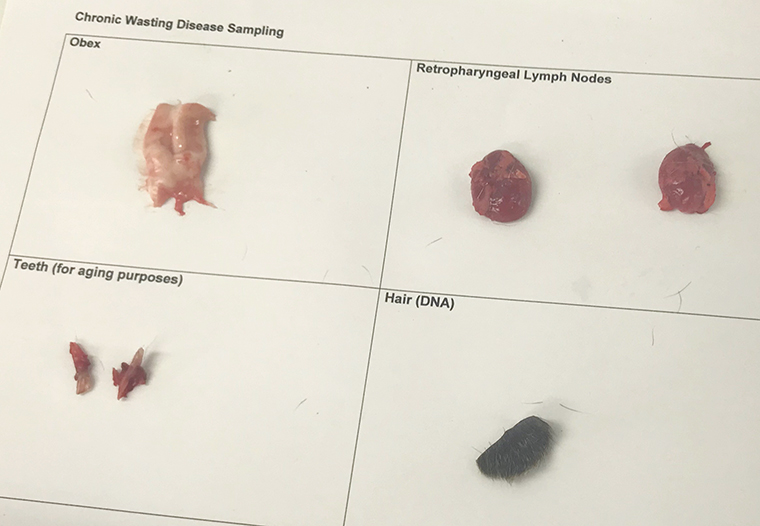
The province is ramping up efforts to keep chronic wasting disease (CWD), a progressive, fatal brain disease, out of Ontario.
Minister of Natural Resources and Forestry John Yakabuski announced the move on Wednesday, Dec. 18. CWD affects deer, elk, moose, and caribou.
The government has passed legislation and developed a response plan should diseases such as CWD be discovered in Ontario, Yakabuski said, after visiting the CWD testing facility at Peterborough’s Trent University. The tour included viewing a mobile necropsy trailer used for sampling deer.
Response zones created
While it has not been detected in the province, CWD was found in 2018 on a deer farm in Quebec, near the Ontario border. It has also been found in five bordering states.
The legislative changes will allow the province to create response zones with special rules, such as requiring hunters to submit animals for disease testing.
Hunters to cull animals
Otherwise-prohibited activities will also be allowed, such as letting hunters dispatch symptomatic wildlife within a specified area.
“The best way to protect the herd is to remove any affected animals as quickly as possible,” Yakabuski said.
Detection would stop exports

The changes are part of the Better for People, Smarter for Business Act. They also include implementing long-term measures such as restricting the movement of certain live animals from jurisdictions where CWD has been detected.
“We believe it’s the right way to go in Ontario,” said Yakabuski, who was joined by Peterborough-Kawartha MPP Dave Smith. “We want to make sure we do everything we can to protect our wildlife and to ensure hunters continue to have opportunities for generations to come.”
Annual program conducted
The province, which conducts an annual CWD surveillance program, has tested more than 13,000 wild deer and elk for CWD since 2002, all with negative results.
Recreational deer hunting generated some $275 million for the province’s economy in 2017. A great deal of the new CWD Prevention and Response Plan will involve engaging hunters, Yakabuski said, calling them the government’s best partners for protection and eradication.
OFAH supports move
“We applaud the government for enacting these changes that will enable it to respond quickly and decisively to a detection of CWD,” Ontario Federation of Anglers and Hunters Executive Director Angelo Lombardo said. “This is a necessary component of keeping Ontario CWD-free and something the OFAH has been seeking for years.”
The OFAH has been pushing for the elimination of deer farms in Ontario since 1991.
Asked what the government plans, Yakabuski noted deer farms are governed by the Ontario Ministry of Agriculture, Food and Rural Affairs. He said the MNRF will work closely with OMAFRA.






Historically our Governments are reactive at best – instead of proactive, Canada Geese, Cormorants, Moose, Fisher, Ticks, to name a few poorly Government managed responses over the years.
Hopefully the OFAH is able to convince or force, our Governments to eliminate farming of Deer and Elk.
It is my understanding CWD has been specifically spread by concentrating Deer and Elk in captivity (farming). Additionally i hope OFAH is able to work with other Provinces to isolate and neutralise infected environments, albeit the infectious agent is extremely resistant in the environment.
Thank you for all your help.
Scott Holland